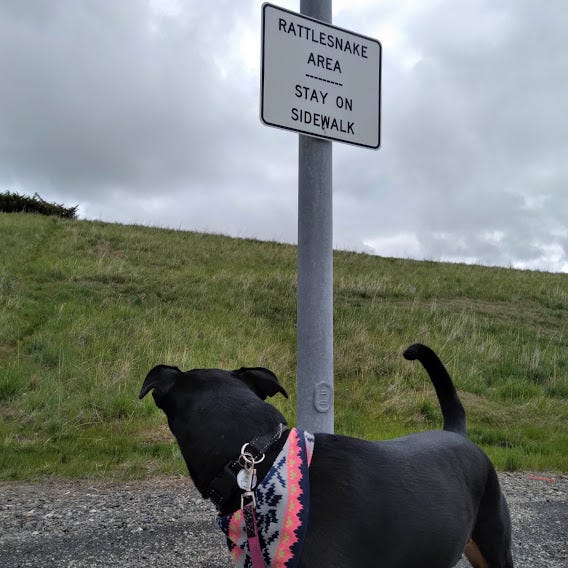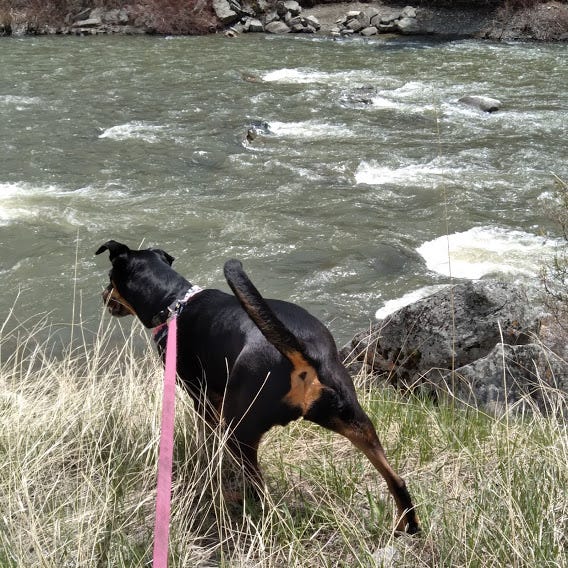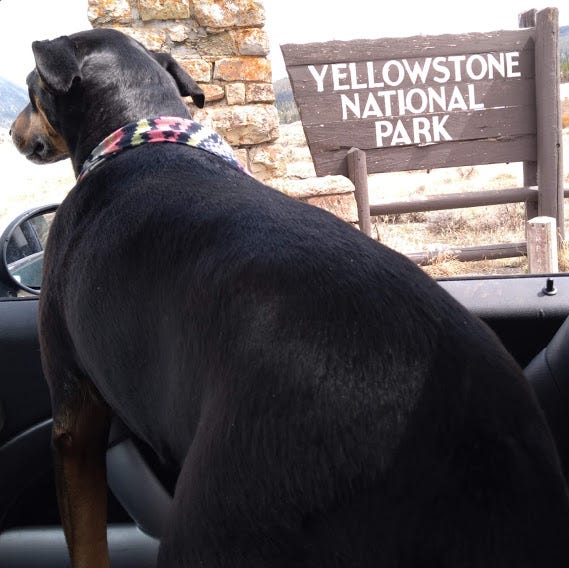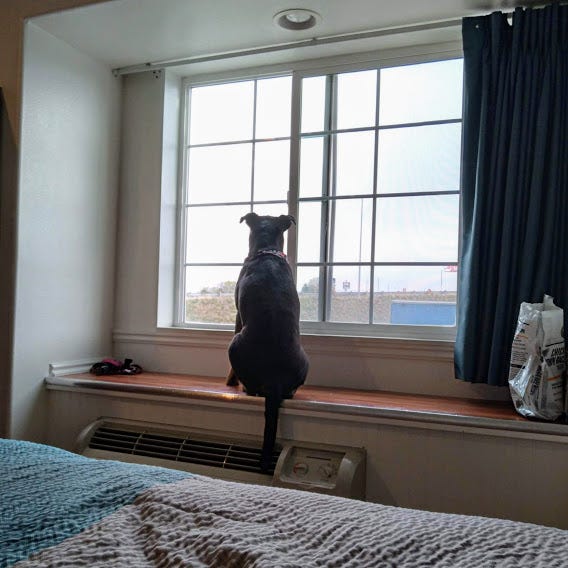Watered-down wanderlust, Part 2
More from the inward-gazing positive-feedback loop, and thoughts on being a 51-percenter
I’m in Idaho Falls, a small city with at least one hydroelectric project located in Idaho, which yesterday afternoon became the 45th state I’ve visited. I would describe the town to you in my own words were this twenty years ago, when you couldn’t simply open a browser tab to Wikipedia to get a more immediate and comprehensive impression than whatever I might unspool. I’ll at least tell you what I first noticed, and what I imagine most runners would seize on if forced to camp here and offered unlimited free time: The city has a well-maintained paved greenway on both sides if the Snake River close to both downtown and the obligatory bank of chain motels in all towns served by the Interstate system, and spots along the path for a dog to take a mid-run dip while coveting geese. That’s mostly why I will spend a second night here tonight, continuing an unplanned pattern of exactly two nights in every town I’ve stayed in, Idaho Falls being the fourth of these. It takes little conscious work to be a good dog-parent, but whatever the actual effort, the sense of purpose and warmth this generates is gleefully disproportionate to any investments made.
Getting here yesterday was an unpleasant experience. I started in Billings at about 10 a.m., already having booked the night’s motel stay and planning to linger inside Yellowstone National Park for a while before getting to Idaho Falls in time to run before sunset. I got to Bozeman, about halfway along the 340-mile route, without feeling any strain, as the weather was fair and the drive was entirely on I-90. But once I headed south, so too did both the weather and the roads, and thus commenced and unplanned but elaborate tutorial for Rosie’s benefit on the use of various curse words and their derivations as nouns, verbs and adjectives, all within a single haphazard, jittery and forlorn sentence.
The Interstate gave way to a two-lane highway along the Gallatin River, more or less in a canyon. This meant that there were no passing lanes for miles on end, and even though I was going at least the speed limit, there was usually at least one pickup truck looming in the rearview. I have a small car that handles perfectly well on turns, and is fun to drive when I’m in the mood. Yesterday I wasn’t, and that was when the first snowflakes started falling. The line of vehicles behind me, all used to this road and better equipped for this kind of May bullshit, grew longer as I was forced to slow.
Also, I hate guardrails. I would rather drive on a winding road next to a river with no guardrails at all and trust myself not to require them than see them presenting what looks to me like an endless steel hazard. They don’t narrow the roadway one bit, and I’ve never had the pleasure of driving off the road by accident once in my life. But as with “Jersey barriers,” I just have a thing about them.
I thought about pulling off into one of the mini-turnouts these roads feature, swaths of dirt off the shoulder where a huge rock might land on your head from a tremendous height if you wait long enough, but there was no point. They weather wasn’t that bad, and it’s not as if I was being obnoxiously tailgated. I was merely creating a lot of stress from personal bugbears and manufactured thoughts in the heads of fellow motorists. Besides, I’d already stopped once to admire the river, before the weather abruptly turned.
I was grateful to make it into Yellowstone, poking my way in through the northwest corner of this massive expanse, but there would be no lingering on the day. The snowflakes became small hailstones, which went away and were replaced by sunshine, which was just as quickly supplanted by even heavier snow from before. But this was a flat, wide open-road, and the snow was Christmas-card style—enormous individual flake-clusters that render this form of wintry delivery from above paradoxically less threatening to behold from a car, maybe because it never seems to accumulate on the pavement.
When I first drove through the park gate, I was amazed by the botanical architecture I saw. The trees on either side, some kind of fir, were pruned to almost the same size, but unobtrusively—a couple steps closer to fully natural than Legoland trees, but in the same family. Past the tops of them, hills rising, and mountains beyond those. The Western slope of the Rockies—no wonder the weather was so fucked up!
Right then, the radio I had forgotten about was suddenly filling the car with Bono’s immaculate voice warbling the lyrics of “With or Without You,” and there was no one and nothing else in sight but Rosie and the road and a vast wonderland I was seeing the tiniest sliver of, and all of the hours of unhappy-motoring angst telescoped into a moment of strange fondness and evaporated. (I suppose “I Still Haven’t Found What I’m Looking For” would have been even better from a thematic perspective, but for every person of my generation who believes that Rattle and Hum was by far U2’s best CD and most “signature” piece of work, there are two who believe the same thing about The Joshua Tree.) It occurred to me that I wished I were able to telepathically gift the package of feelings I was experiencing in their whole, untainted form to someone else, because it was so rare, which is probably a way of saying too bad there is no one else here in this car who can appreciate this in the same way. “Too bad,” as if everything to set up precisely these semi-solitary conditions was inevitable.
But no matter what, unexpected moments like those carry a lot of weight in trying to answer the question of why I chose to make this trip in the first place. I think I knew that the uncomfortable or boring moments would outnumber the pleasurable ones, but counted on the islands of pleasure tipping the whole thing in favor of “glad I went.” This, as I will get into below, is counter to almost all decisions I make these days, from the recreational to the vocational.
West of the park, the rest of the drive was mostly sunny again, with everyone doing 80 in a cheerful phalanx of gas fumes, metal and rubber on U.S. 20. In the end, I summed up my day as at least as much work as play despite nothing really hinging on the mission per se. I would even characterize it as “ambitious.” And now as I sit here in a different version of the last motel room, contemplating my own contemplations, I’m looking at how the term ambitious has applied to my own life as my approach to living has changed over the years, and how despite appearances I don’t think my own level of ambition, as the word is widely understood in these nominally United States, has fluctuated much since I was a teenager. Maybe this is common, but the results play out differently for people who become slotted into different tracks early in their lives.
In the environment in which I and most of my peers were raised, it was typical for parents to encourage their kids to play sports or otherwise be a part of some kind of team. Virtual clubs weren’t really a thing in the 1970s and 1980s, so if you joined something, or your parents joined you to it, you showed up in person and played by whatever official and unofficial rules were in place, and if you were the sort who thrived in that particular social space, you stuck around.
I didn’t discover a sport I thought I could be good at until high school, and even that one got off to a tenuous start. But I was extremely adept at academics, and when you seize on that as a child because you happen to like learning, it makes your life a hell of a lot easier for the next dozen-plus years regardless of whatever else is going on. It opens doors, to use one of those hackneyed metaphors I said I’d eschew along with five-star words, and walking through them often means greeting a lot of joiners on the other side. Thriving academically means winding up being a part of lots of clubs, most of them aimed at padding college resumes. I wound up in the National Honor Society and the Varsity Club (which to my knowledge never met once or did anything) and was also a formidable mathlete. I was also technically a three-sport captain, though I’ll always maintain that this is an unhealthy status for one to advertise as a distance runner. Oh, and I was in the Cub Scouts too, but not for very long. And I was even a reserve officer in the U.S. Army for a few years, which, while stemming purely from financial rather than “patriotic” motives, is as official a form of signing up for something as a young man can find.
The point of all of this isn’t so much whether I liked or disliked the various experiences broadly associated with joiner-hood, and hence, at least symbolically, with traditional American ambition. It’s that I, like most, was led to believe that being a part of social groups is, ipso facto, a desirable quality, one that’s both rewarded and rewarding, sometimes in concert and sometimes in turns. While I don’t question this, it’s plain that organizing one’s life largely around social activities, social groups and even whole social ethos isn’t for everyone, and this can leave those of us who don’t discover or admit this about themselves until fairly late in life feeling confused and a little lost.
Religion and its associated formal institutions represent an obvious and primal form of social cohesion. It’s easy, and at times necessary, to push back against the fascist, transformative, and obviously stupid aims of Christian zealots (e.g., replacing evolution with creationism in public-school science classes), although the much more widely sanctioned antics of the Wokish have started to make the cultural crusades of Bible-thumping bumblefucks seem like the playful overtures of fundamentally harmless scamps. But there are good reasons religious organizations persist, because it feels good to be part of something a great many of your neighbors embrace, even if looking under the hood at the whys and whats makes most sanguine people a little uncomfortable.
While Catholicism has become the butt of dour jokes thanks to the many pederasts its traditional leadership rules and roles have vigorously selected for over the decades, you would be a fool to not notice that kids who attend Catholic schools tend to thrive later in their lives. This is surely rooted to a large extent in socioeconomics, but I was part of a Catholic-school environment that was sort of the Motel 6 of parochial educational centers, and the many kids I knew and worked with have gone on to become wonderfully creative and productive adults. Being a part of a community and being caught up in its essence can be more important than that community’s granular elements, a quality that has helped give a lot of troubled kids…guardrails, and allowed a lot of inherent superstars to shine even brighter. If you accept this non-groundbreaking observation about social psychology, you should be able to accept that a lot of good-hearted people have been caught up in the thrall of Wokism, which promises in-group cohesion at the expense of methodically and ruthlessly shooting people in out-groups full of holes.
Anyway, if I look at the arc of my life, it suggests someone who was ambitious and then just gave up. Who goes to an Ivy League medical school until the fun parts have just started and bails, and spends the rest of his life doing just enough to get by? Yes, for a long time, substance abuse knocked me off a number of perches I had managed to reach. But choosing to stay where I landed, I think, has little to do with that, and if anything, reflects a kind of intrinsic big-picture lassitude that leads people who know they should drink to keep doing it anyway.
The years I spent freelancing, training for marathons and moving around frequently may have given the impression of someone who planned to get serious or “grow up” once the Olympic Trials dream ended one way or another. But in reality, that was never the case. I had my two best periods of running when working full-time and living with a partner, and it was clear to me even then that I was never going to be someone who worked to amass much more than he needed. I was and remain aware of the gross limitations this places on one’s ability to impress people, but fortunately, wanting to be liked for the usual reasons people want to be liked has just never been my game.
What I see is someone who never tried especially hard to be anything but what he naturally is—someone who likes to read and solve math problems obsessively, and needs to move around a lot to feel right. Mix that in with a stable if unglamorous upbringing, and you get a kid who gets fantastic grades and plays by the rules well enough to advance to the expected educational and vocational junctures. But when those same natural tendencies no longer had the same outlets, and I had to start making long-term decisions fully on my own, I realized all along that I preferred to be by myself in a work environment as much as possible, and at most other times, too. That’s not a mindset that opens many doors to opportunities, but all along it’s a tradeoff I’ve made without blinking or even thinking about it.
I haven’t become an iota less ambitious, because I’ve never been ambitious about anything besides running in the first place. It’s just that my tendencies stopped automatically guiding me into channels where anyone cares much about how high you expect to rise in a given editorial hierarchy or chain-of-command, or what you plan to own. I think I’m just sort of a bum, industrious given the right inspiration, and that I couldn’t help but give the impression otherwise for a long time.
This was difficult to home in on until I had stayed sober for a while, because it had been so long since I’d had enough savings and options to really chart my own life course. But even though I am confident in not causing or experiencing the same brand of pain in human or vocational relationships as I once did, I’m equally confident in continuing to fuck important things up and leave hurt in my wake, and my response is to basically avoid anything that might leave the smallest scar on me or anyone I’m close to.
Three and a half years ago, I ended a relationship most people in my situation would have stayed in. The next spring I decided to give competitive running another try, and after about six months and a small string of slow—but more importantly, half-steam—races—I put that aside, too. I had apparently come to a point where if I decided there were even slightly better than even odds of something being unnecessarily uncomfortable, I was going to skip or discard it. Even a perceived 51 percent chance of merely intermittent conviction that I am doing, or will do, something in a way that feels even partly incompetent takes an idea or aspiration right off the table. Right now, being a dog-dad has to be enough, and luckily it is.
All of this, of course, has been made more acute by the sudden emergence of a startling number of people becoming, en masse, completely mindless. This is undisputed; it’s not me, it’s definitely “everyone else” this time. Between Wokism and various pandemic-driven inanities, I have never felt less like being less of a contributor to “the greater good” in my life. I don’t even think any of the drivers of both forms of bullshit would even care at this point to ground any of their shrill proclamations in evidence or even basic sense, just as an Evangelical Christian changes the subject when you propose the geological and nautical unlikelihood of Noah’s perilous forty-day journey on the very high seas.
I think I wrote this not because you give a shit, but because I would rather believe that I am basically the same person I have always been since I was cognitively sophisticated enough to appreciate the concept of "identity” than think I have become something less, or different, as a result of being scuttled by my own repeated bad choices or because I’m too cynical to find a social niche of my own, one that doesn’t mind being called on its lies and bigotry. I value the same things I always did, which aren’t all that much or complicated. Hell, I’m probably the only one I know at this point who still thinks I might ever do something different. I did look last year into getting a master’s degree in environmental science at the college I can practically see from my front door, but as much as I think I would love it, it wouldn’t be worth the literal cost.
I can’t say I refuse to take on frustrating challenges altogether. I am close enough to being able to play a song that was so far out of my range less than a year ago that I could quit now and be twice as far ahead as I thought I would ever get from a musicianship standpoint, even though it’s only one short song. If I had a band backing me, the power chords would wallpaper over my miscues and no one would really hear a difference. But I started learning it to play the real song, not a passable hack version, and that’s where I will go with it before moving to next one on the list. I hope I don’t get home in a few days to discover that I’ve forgotten everything. But it’s nice to have a reason to want to get home while also feeling like loitering here for a bit, too.
I may be in Utah for my next report, which will return to the topic of high-school track (I cringe at the number of instances of “I” this post contains, but it’s a road trip and I guess readers know what they’re in for with the article titles.)





